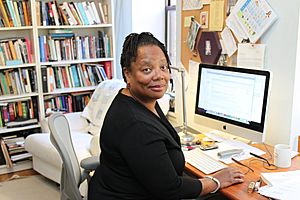Erica Hunt facts for kids
Quick facts for kids
Erica Hunt
|
|
|---|---|
 |
|
| Born | March 12, 1955 New York City, U.S. |
| Occupation |
|
| Education | San Francisco State University (BA) Bennington College (MFA) |
| Spouse | Marty Ehrlich |
| Parents | Thomas Edward Hunt Daphne Lindsey Hunt |
| Relatives | Fern Hunt (sister) |
Erica Hunt (born March 12, 1955) is an American writer, teacher, and organizer from New York City. She is known for her poetry and essays. Erica Hunt was part of a group called "Language poets" when she lived in San Francisco in the late 1970s and early 1980s. Her work is also important to a style of art called "avant-garde black aesthetic." This style grew after the Civil Rights Movement and Black Arts Movement.
During the 1990s and 2000s, Hunt worked with groups that help black communities. From 1999 to 2010, she led the 21st Century Foundation in Harlem. Today, she writes and teaches at Wesleyan University.
Contents
Erica Hunt's Early Life
Erica Hunt was born in Manhattan, a part of New York City. Her parents worked hard to support their family. Her father, Thomas Edward Hunt, delivered mail and worked for the city's transportation system. Her mother, Daphne Lindsey Hunt, was blind and worked as a transcriptionist for New York City.
Erica's older sister, Fern Hunt, is a talented mathematician. Fern earned her PhD in 1978 and works at a national science institute. Erica once said that her family members were good at observing people and situations. They were also good at surviving tough times.
Education and Moving Back to New York
In 1980, Erica Hunt earned a Bachelor of Arts degree in English. She studied at San Francisco State University. There, she learned about poetry from teachers like Kathleen Fraser and Michael Palmer. Later, in 2013, she earned a Master of Fine Arts degree from Bennington College.
While in the Bay Area in the late 1970s and early 1980s, Hunt was very active in the poetry world. She often read her poems at a coffeehouse called The Grand Piano. This place was a center for "Language poets." In 1981, Hunt moved back to New York City. She brought with her the energy for public talks and poetry gatherings she had learned in San Francisco.
From 1985 to 1999, she worked for the New World Foundation. This group helps social justice causes across the country.
Creative Work and Community Projects
After returning to New York, Erica Hunt became interested in "avant-garde jazz" music. This is a type of jazz that is very experimental. She even thought about writing about music. In 1983, she met her husband, Marty Ehrlich, who is a saxophonist.
In the late 1980s, Hunt joined the board of directors for the Segue Foundation. This arts group helped publish poetry books and supported artists. They also funded art programs in prisons. One big project was restoring an old building in New York City. Erica Hunt worked with filmmakers and a dancer to turn it into a space for artists to live, work, and perform. This project finished in 1988 and helped artists until 2002.
Erica Hunt's Poetic Works
When Erica Hunt lived in the Bay Area, she often went to poetry readings. She met many writers who were part of the "Language poetry" movement. This style of poetry focuses on how language itself works. It often plays with words and sentences in new ways. Some of her poems were included in a famous Language poetry book called In the American Tree.
Her most famous work is Arcade (1996). She created this book with artist Alison Saar. Arcade explores ideas like how women see themselves, how race is shown in media, and city life. It uses an experimental style that makes readers think about the words and how they shape these themes. Other books by Hunt include Local History (1993) and Piece Logic (2002). She also wrote for many literary magazines.
Erica Hunt's poetry is known for being involved with politics. She believes that poetry can make people think about society. Her poems do not tell people what to believe. Instead, they use language in a way that makes readers ask questions. Hunt thinks poetry should help build a society that is free, fair, and democratic.
Awards and Recognition
Erica Hunt has received several awards and fellowships for her work:
- 2005–06: Fellow in Poetics & Poetic Practice at the University of Pennsylvania.
- 2004–05: Duke University/University of Cape Town Fellowship in Public Policy.
- 2001: Foundation for Contemporary Art Grants to Artists award.
- 1993: The Fund for Poetry.
- 1992: Blue Mountain Center Fellow.
- 1984: Djerassi Resident Artists Program Fellow.
 | Bayard Rustin |
 | Jeannette Carter |
 | Jeremiah A. Brown |

